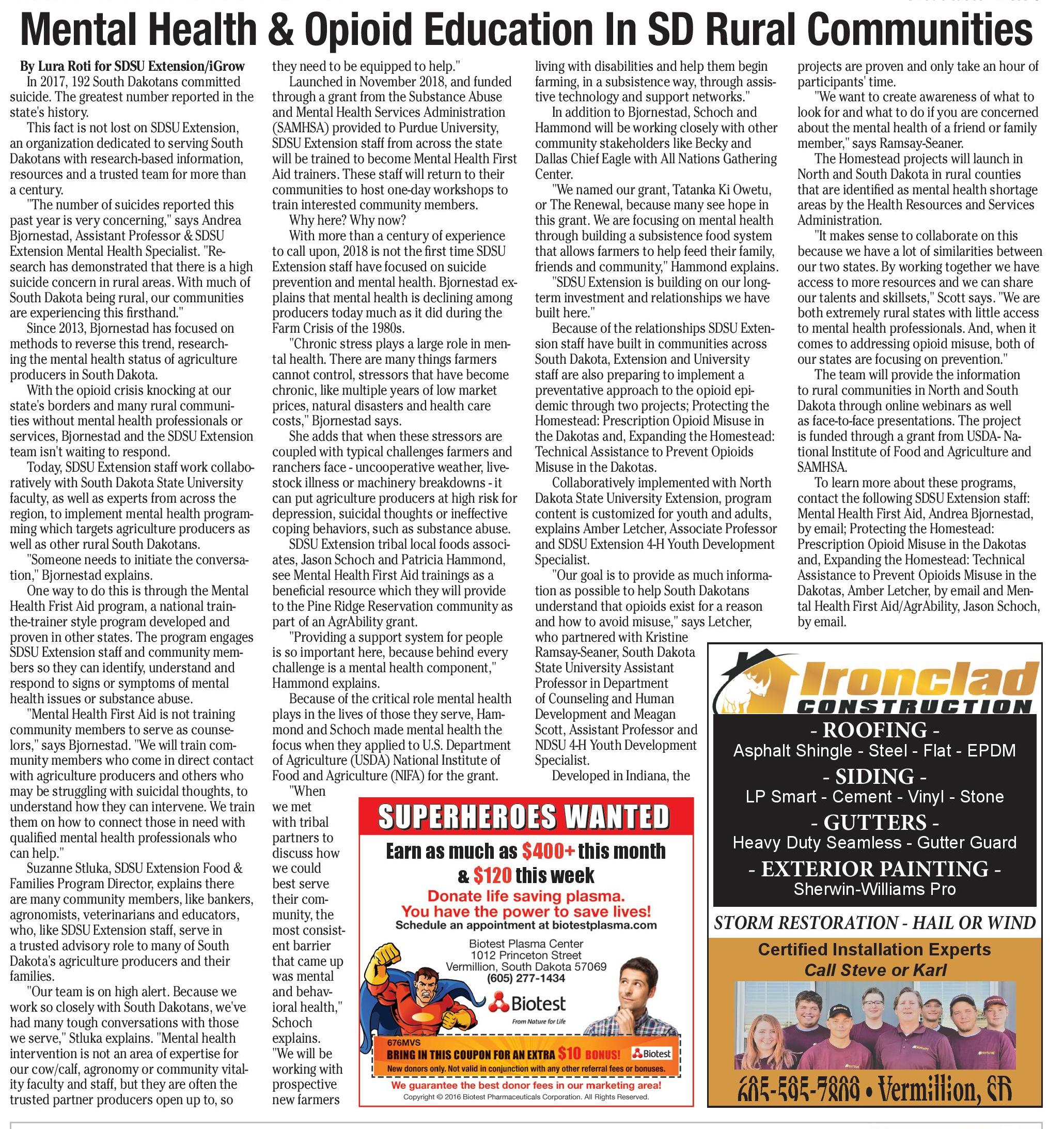112718_YKBP_A5.pdf




Broadcaster Press 5
November 27, 2018 www.broadcasteronline.com
Mental Health & Opioid Education In SD Rural Communities
By Lura Roti for SDSU Extension/iGrow
In 2017, 192 South Dakotans committed
suicide. The greatest number reported in the
state's history.
This fact is not lost on SDSU Extension,
an organization dedicated to serving South
Dakotans with research-based information,
resources and a trusted team for more than
a century.
"The number of suicides reported this
past year is very concerning," says Andrea
Bjornestad, Assistant Professor & SDSU
Extension Mental Health Specialist. "Research has demonstrated that there is a high
suicide concern in rural areas. With much of
South Dakota being rural, our communities
are experiencing this firsthand."
Since 2013, Bjornestad has focused on
methods to reverse this trend, researching the mental health status of agriculture
producers in South Dakota.
With the opioid crisis knocking at our
state's borders and many rural communities without mental health professionals or
services, Bjornestad and the SDSU Extension
team isn't waiting to respond.
Today, SDSU Extension staff work collaboratively with South Dakota State University
faculty, as well as experts from across the
region, to implement mental health programming which targets agriculture producers as
well as other rural South Dakotans.
"Someone needs to initiate the conversation," Bjornestad explains.
One way to do this is through the Mental
Health Frist Aid program, a national trainthe-trainer style program developed and
proven in other states. The program engages
SDSU Extension staff and community members so they can identify, understand and
respond to signs or symptoms of mental
health issues or substance abuse.
"Mental Health First Aid is not training
community members to serve as counselors," says Bjornestad. "We will train community members who come in direct contact
with agriculture producers and others who
may be struggling with suicidal thoughts, to
understand how they can intervene. We train
them on how to connect those in need with
qualified mental health professionals who
can help."
Suzanne Stluka, SDSU Extension Food &
Families Program Director, explains there
are many community members, like bankers,
agronomists, veterinarians and educators,
who, like SDSU Extension staff, serve in
a trusted advisory role to many of South
Dakota's agriculture producers and their
families.
"Our team is on high alert. Because we
work so closely with South Dakotans, we've
had many tough conversations with those
we serve," Stluka explains. "Mental health
intervention is not an area of expertise for
our cow/calf, agronomy or community vitality faculty and staff, but they are often the
trusted partner producers open up to, so
they need to be equipped to help."
living with disabilities and help them begin
projects are proven and only take an hour of
Launched in November 2018, and funded
farming, in a subsistence way, through assis- participants' time.
through a grant from the Substance Abuse
tive technology and support networks."
"We want to create awareness of what to
and Mental Health Services Administration
In addition to Bjornestad, Schoch and
look for and what to do if you are concerned
(SAMHSA) provided to Purdue University,
Hammond will be working closely with other about the mental health of a friend or family
SDSU Extension staff from across the state
community stakeholders like Becky and
member," says Ramsay-Seaner.
will be trained to become Mental Health First Dallas Chief Eagle with All Nations Gathering
The Homestead projects will launch in
Aid trainers. These staff will return to their
Center.
North and South Dakota in rural counties
communities to host one-day workshops to
"We named our grant, Tatanka Ki Owetu,
that are identified as mental health shortage
train interested community members.
or The Renewal, because many see hope in
areas by the Health Resources and Services
Why here? Why now?
this grant. We are focusing on mental health
Administration.
With more than a century of experience
through building a subsistence food system
"It makes sense to collaborate on this
to call upon, 2018 is not the first time SDSU
that allows farmers to help feed their family,
because we have a lot of similarities between
Extension staff have focused on suicide
friends and community," Hammond explains. our two states. By working together we have
prevention and mental health. Bjornestad ex"SDSU Extension is building on our longaccess to more resources and we can share
plains that mental health is declining among
term investment and relationships we have
our talents and skillsets," Scott says. "We are
producers today much as it did during the
built here."
both extremely rural states with little access
Farm Crisis of the 1980s.
Because of the relationships SDSU Extento mental health professionals. And, when it
"Chronic stress plays a large role in mension staff have built in communities across
comes to addressing opioid misuse, both of
tal health. There are many things farmers
South Dakota, Extension and University
our states are focusing on prevention."
cannot control, stressors that have become
staff are also preparing to implement a
The team will provide the information
chronic, like multiple years of low market
preventative approach to the opioid epito rural communities in North and South
prices, natural disasters and health care
demic through two projects; Protecting the
Dakota through online webinars as well
costs," Bjornestad says.
Homestead: Prescription Opioid Misuse in
as face-to-face presentations. The project
She adds that when these stressors are
the Dakotas and, Expanding the Homestead:
is funded through a grant from USDA- Nacoupled with typical challenges farmers and
Technical Assistance to Prevent Opioids
tional Institute of Food and Agriculture and
ranchers face - uncooperative weather, liveMisuse in the Dakotas.
SAMHSA.
stock illness or machinery breakdowns - it
Collaboratively implemented with North
To learn more about these programs,
can put agriculture producers at high risk for Dakota State University Extension, program
contact the following SDSU Extension staff:
depression, suicidal thoughts or ineffective
content is customized for youth and adults,
Mental Health First Aid, Andrea Bjornestad,
coping behaviors, such as substance abuse.
explains Amber Letcher, Associate Professor by email; Protecting the Homestead:
SDSU Extension tribal local foods associand SDSU Extension 4-H Youth Development
Prescription Opioid Misuse in the Dakotas
ates, Jason Schoch and Patricia Hammond,
Specialist.
and, Expanding the Homestead: Technical
see Mental Health First Aid trainings as a
"Our goal is to provide as much informaAssistance to Prevent Opioids Misuse in the
beneficial resource which they will provide
tion as possible to help South Dakotans
Dakotas, Amber Letcher, by email and Mento the Pine Ridge Reservation community as
understand that opioids exist for a reason
tal Health First Aid/AgrAbility, Jason Schoch,
part of an AgrAbility grant.
and how to avoid misuse," says Letcher,
by email.
"Providing a support system for people
who partnered with Kristine
is so important here, because behind every
Ramsay-Seaner, South Dakota
challenge is a mental health component,"
State University Assistant
Hammond explains.
Professor in Department
Because of the critical role mental health
of Counseling and Human
plays in the lives of those they serve, HamDevelopment and Meagan
mond and Schoch made mental health the
Scott, Assistant Professor and
focus when they applied to U.S. Department
NDSU 4-H Youth Development
Asphalt Shingle - Steel - Flat - EPDM
of Agriculture (USDA) National Institute of
Specialist.
Food and Agriculture (NIFA) for the grant.
Developed in Indiana, the
"When
LP Smart - Cement - Vinyl - Stone
we met
with tribal
partners to
Heavy Duty Seamless - Gutter Guard
discuss how
Earn as much as $400+ this month
we could
& $120 this week
best serve
Sherwin-Williams Pro
their community, the
STORM RESTORATION - HAIL OR WIND
most consistent barrier
Certified Installation Experts
that came up
Call Steve or Karl
was mental
and behavioral health,"
Schoch
explains.
"We will be
working with
prospective
new farmers
- ROOFING - SIDING -
- GUTTERS -
- EXTERIOR PAINTING -
605-595-7809 • Vermillion, SD
For every Medicare question.
Announcing a new
Medicare partnership
in North Dakota and
South Dakota.
Sanford Health has teamed up with HealthPartners, a
Minnesota-based non-profit health organization, to offer
North Dakota and South Dakota a different perspective on
Medicare. One with local care, expert customer service and
health plan options all working together for you. Don’t settle
for any health plan. Get yourself a health partner.
Medicare answers from
Enroll today at healthpartners.com/newpartner
or call us at 800-247-7015 (TTY: 711)
HealthPartners is a Cost plan with a Medicare contract. Enrollment in HealthPartners depends on contract renewal.
Other providers are available in our network. We take calls October 1 to March 31, 8 a.m. to 8 p.m., CT, seven days a week.
April 1 to September 30, 8 a.m. to 8 p.m., CT, Monday through Friday. 19534 (9/18) ©2018 HealthPartners
H2462_113150_C IR 09/2018















 Previous Page
Previous Page






